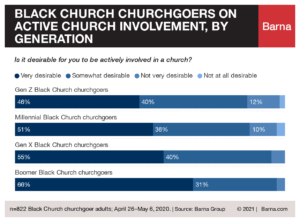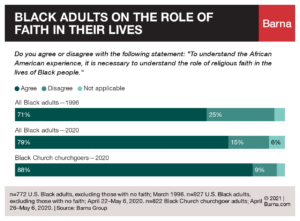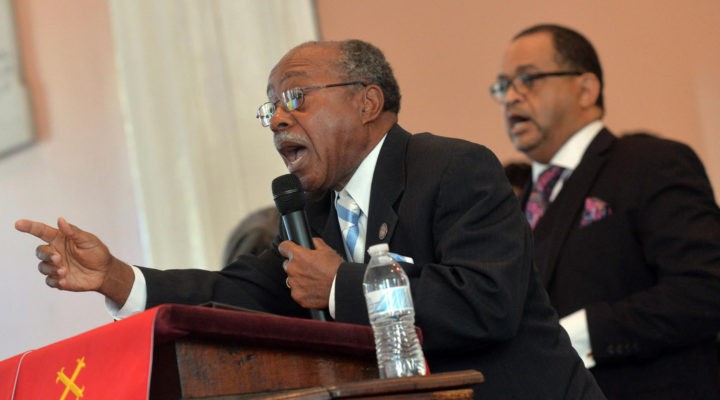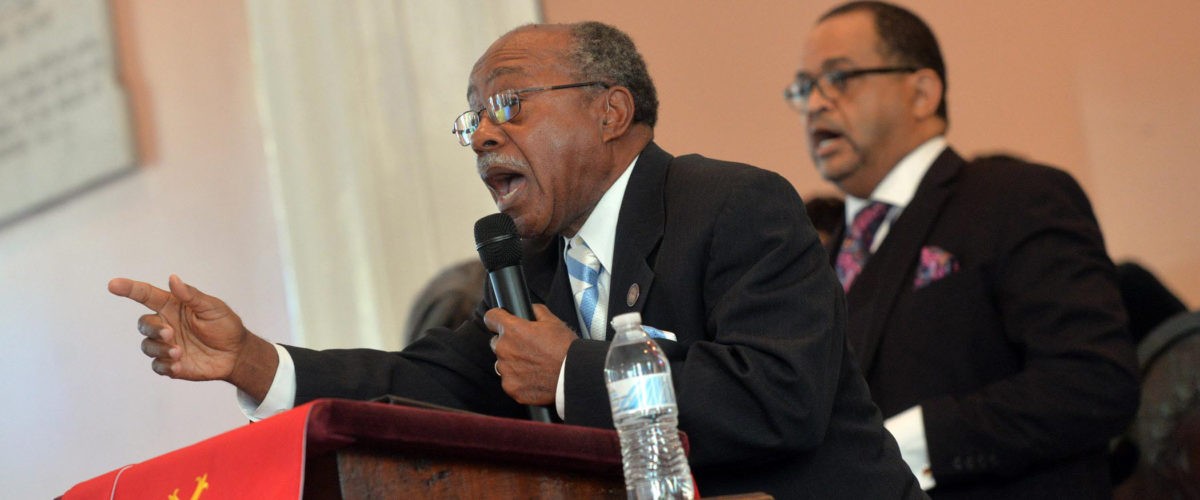A growing number of African Americans say that understanding the Black experience requires an appreciation of the role of the church in Black lives, new research shows.
But the same study also uncovered a drop in interest among Blacks in being part of faith communities.
“The proportion of Black adults who say church involvement is overall ‘desirable’ is on the decline, from 90% in 1996 to just 74% today,” the Barna Group reported in the latest segment of its State of the Black Church project.
 That portion of the study was released in February as the nation observed Black History Month, which also saw the release of the PBS documentary “The Black Church: This is Our Story. This is Our Song,” hosted by Henry Louis Gates Jr. The documentary highlights the essential nature of the Black church in understanding Black culture in America.
That portion of the study was released in February as the nation observed Black History Month, which also saw the release of the PBS documentary “The Black Church: This is Our Story. This is Our Song,” hosted by Henry Louis Gates Jr. The documentary highlights the essential nature of the Black church in understanding Black culture in America.
The Barna report not only dovetails with the PBS documentary but also with years of sociological research documenting the decline in religious affiliation throughout the U.S. population.
“The religious landscape of the United States continues to change at a rapid clip,” the Pew Research Center said in 2019. In 2018 and 2019, “65% of American adults describe themselves as Christians when asked about their religion, down 12 percentage points over the past decade.”
This trend is no respecter of generation, gender or socio-economic status and also proves true among Hispanics, whites and Blacks, Pew said. “The data shows that just like rates of religious affiliation, rates of religious attendance are declining. Over the last decade, the share of Americans who say they attend religious services at least once or twice a month dropped by 7 percentage points, while the share who say they attend religious services less often (if at all) has risen by the same degree.”
“Members of the Black church are even more insistent that faith is crucial to the Black experience.”
Yet, passion and loyalty toward the church are especially powerful among churchgoing African Americans, Barna reported. “Members of the Black church are even more insistent that faith is crucial to the Black experience, with half (50%) agreeing ‘strongly’ (plus 38% who agree ‘somewhat’).”
“One reason for this may be that … there is a strong opinion that an association with the Black church provides comfort and agency, countering a broader sense of political powerlessness,” the research group suggested. “Additionally, on a personal level, faith is considered a source of emotional strength, a perspective that has held steady among Black adults between 1996 (91%) and 2020 (87%). Nearly all Black churchgoers today express this sentiment.”
Barna said it provided a range of positive and negative terms for respondents to link to their perception of the church. Most selected upbeat designations such as “reliable,” “safe,” “healing” and “important.” Church members held the most strongly positive opinions.
“More negative adjectives are less often chosen, though it should be noted that roughly one-third tends to see the Black church as ‘old-fashioned’ or even ‘stifling,’ rather than ‘fresh’ or ‘liberating’ — and that some negative views are held more firmly by those who are actually a part of Black churches.”
 The polling revealed that generational differences shape attitudes toward faith. Black Boomers who are church members “express great enthusiasm” about the church, with 66% describing it as “very desirable.” By comparison, 55% of Gen X, 51% of Millennials and 46% of Gen Z say they feel the same, Barna said.
The polling revealed that generational differences shape attitudes toward faith. Black Boomers who are church members “express great enthusiasm” about the church, with 66% describing it as “very desirable.” By comparison, 55% of Gen X, 51% of Millennials and 46% of Gen Z say they feel the same, Barna said.
The numbers indicate that African American congregations likely face the same challenges as others in American society, Barna noted. “This trend over age groups hints at some of the retention issues facing the Black church — specifically in historically Black denominations. When compared to churchgoers in other majority Black/Black-led congregations, interest in church involvement wanes for those in historically Black churches.”
The Barna study also found higher levels of support for clergy among Black Christians: “Though Black Christians question their personal involvement in church, they are more certain about the importance of pastors.”
In 1996, 63% of Black adults agreed that pastors in African American churches “are the most important leaders within the Black community,” Barna reported. That opinion actually grew to 69% by 2020.
“Naturally, agreement climbs somewhat for those who attend Black churches” with 36% agreeing ‘strongly’ and 41% agreeing “somewhat,” according to the report. And “perhaps surprisingly, it actually increases for young Black church churchgoers.”
Related articles:
Black church important antidote to social despair caused by white supremacy
Kentucky seminary receives Baugh Foundation grant to start Institute for Black Church Studies


